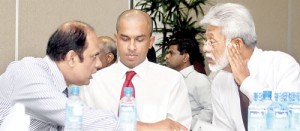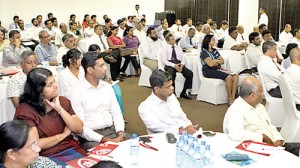SEC to rejuvenate Small Investors Association
The Securities and Exchange Commission (SEC) has submitted a commission paper recently at its ever commission meeting – after the advent of the new regime – to rejuvenate a proposal to start a Small Investors’ Association (SIA) which was mooted by the Business Times.
Sabotage
At a seminar on minority shareholder rights this week in Colombo, the first in a series of seminars to empower investors organised by the Institute of Chartered Accountants of Sri Lanka (CA) in conjunction with the CFA Society Sri Lanka and the Colombo Stock Exchange (CSE), Mr. Karunaratne said that the Business Times was actively promoting the SIA, but it was sabotaged. “In my earlier stint as the SEC Chairman I supported this initiative by the Business Times, but the so-called majority shareholders sabotaged it. This time we’re doing it a second time and hopefully it won’t be sabotaged.”

CA Sri Lanka President Arjuna Herath and SEC Chairman Thilak Karunaratne in conversation while Copal Amba Country head Chanakya Dissanayake seems a disinterested bystander. Pix by Indika Handuwala.
In response to a statement by minority rights activist, K.C. Vignarajah, who alleged that SEC probes aren’t conducted in confidence, Mr. Karunaratne stressed that the regulator gets many complaints, but there’s ‘very’ little that they can do. “(Fighting) Minority shareholder rights are one of the costliest exercises (if done individually)”, he said, pointing out that this is the very reason why SIAs are important. He also said that SIAs are thriving in countries like Malaysia and that Sri Lanka needs to take a leaf out of them.
Arjuna Herath, President CA Sri Lanka noted that the institute is looking forward to forging partnerships with SIA (when it’s formed). “Many companies forget minority shareholders. The attitudes of corporates should align (to accommodate small shareholders) and they need to also implement a culture accordingly.”
Partner at corporate law firm Nithya Partners, Naomal Goonewardena noted that there should be safeguards for investors for a reasonable playing field, adding that those with (insider) information shouldn’t trade.
“There are a few companies who misuse the provisions of the Colombo Stock Exchange (CSE) listing rules in making disclosures just to create an unnecessary flurry in the market,” He said that by and large it (disclosing) is done correctly, but there are some marginal companies which actually disclose things which are actually insignificant for the purpose of exciting the investors. He added that, “Section 8 of CSE listing rules states, ‘A listed entity shall make immediate disclosure of price sensitive information to the exchange in order to ensure the maintenance of a fair and orderly securities market.”
Roshani Kobbekaduwa, Secretary Legal, De Sarams and Co, discussing the ‘Rights afforded to Shareholders in relation to Company Documents and Procedure at Shareholder Meetings’ clarified what’s meant by a ‘Shareholder’, ‘as a person whose name is entered in the company register as the holder of one or more shares in the company.’
“Until a person’s name is entered in the register; a person named as a shareholder in an application for incorporation of a company at the time of the registration of that company, is entitled under a registered amalgamation proposal to be a shareholder of the amalgamated company and a person to whom a share has been transferred and those name ought to be entered in the register.”
Explaining the rights attached to a share, she said that subject to the company articles, a share shall confer on the holder the right to one vote on a poll on any resolution proposed at a meeting of the company, the right to an equal share in the dividends paid by the company and the right to an equal share in the distribution of surplus assets when liquidating a company.

Audience
Right to inspect records
She said that a shareholder, or a person authorised by him, can inspect records at the office of the company from 9.00 am to 4.00 pm, between the third and eighth working day after serving written notice on the company.
“These records are, the minutes of meeting and resolutions of the shareholders, Copies of written communications sent to all the shareholders during the preceding 10 years including annual reports and financial statements, certificates issued by the directors under the Act, and the interest register.”
She said that a shareholder may require a copy of any documents made available for inspection in the manner discussed previously to be sent to him within five working days after he has made a written request for such copy and has paid a reasonable copying and administration fee as may be determined by the company.
An AGM must be held once in each calendar year, not later than six months after the balance sheet date of the company and not later that fifteen months after the previous annual general meeting, and an Extraordinary General Meetings, which many be convened; by the board of directors, or on the requisition of shareholders holding (as at the date of the requisition) shares carrying not less than ten per centum of the votes which may be on any resolution.
“Unless the company’s articles provide otherwise, voting at shareholder meetings is generally by a show of hands,” Ms. Kobbekaduwa said, noting that where voting is by a show of hands, each shareholder shall have one vote (irrespective of the number of share held by that shareholder).
If a resolution proposed at a meeting is defeated on a show of hands, a poll may be demanded by (qualified) shareholders or by the chairman of the meeting. On a poll every shareholder shall have one vote in respect of each share held by him.
A poll can be demanded by not less than five shareholders having the right to vote at the meeting, or a shareholder or shareholders representing not less than one tenth of the total voting rights of all the shareholder having the right to vote at the meeting. “In a poll, every shareholder having the right to vote at that particular meeting will be handed a ballot card in which he will have the option to mark “for” or “against” each resolution on which a poll has been called.
A shareholder who is entitled to more than one vote on a poll need not cast all his votes in the same way and the ballot cards are then collected and, having these added up, the chairman declares the result of the poll,” Ms. Kobbekaduwa added.
The shareholder or the chairman has the power to appoint scrutinisers to examine the counting of the votes at a poll and to report the results to the chairman, and this is often done, she said, adding that if the articles stipulate that the poll is to be conducted ‘in such manner as the chairman may direct’, the chairman will decide whether the poll will be taken then and there or at some other time and date nominated by the Chairman.
“If, however, the articles require that the poll be taken immediately, it must be taken as soon as practicable in the circumstances.”


